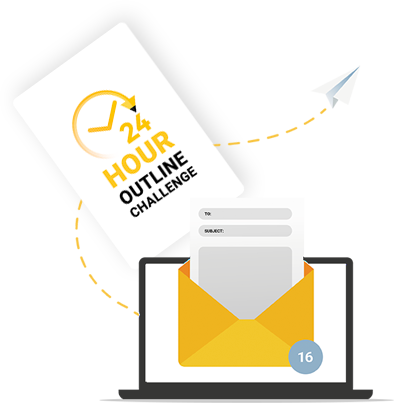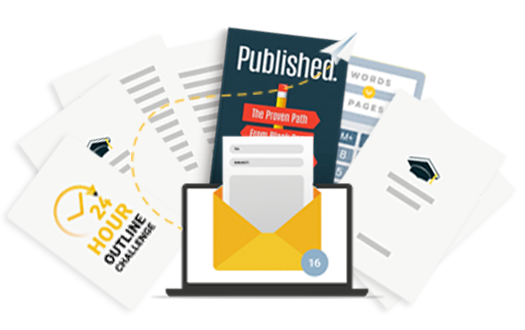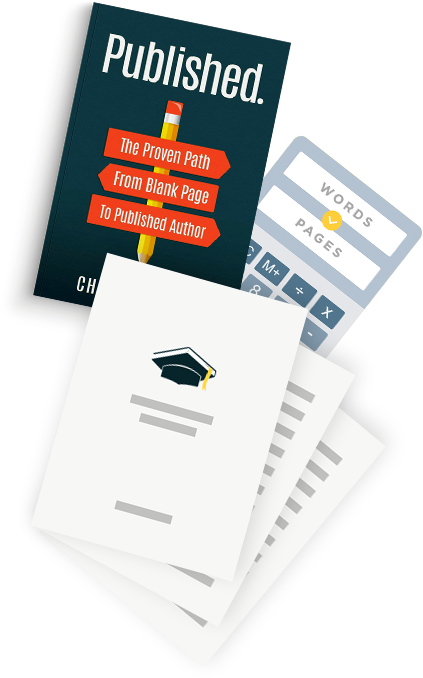If you’re ready to publish a book, but don’t know what to do after you have your book finished… Going with a publishing house might make sense. But then, it also might not.
You wrote a book? Congrats! … Now what?
You’ve got two basic options for publishing your book: traditional publishing and self-publishing.
But how do you decide which is best for you? Depending on your personal goals, each option could be your saving grace or your biggest downfall.
Choosing the best publishing option will set you up for success. But this means understanding them. For the purpose of this post, we’re going to explore publishing houses and if this method is right for you.
Here’s what you need to know about publishing houses:
- What’s a publishing house?
- What are the Big 5 publishing houses?
- How do publishing houses work?
- Overview of traditional publishing
- What’s a vanity press?
- Alternative: self-publishing
- How to get started with self-publishing
What’s a publishing house?
A publishing house’s main purpose is to find authors and their manuscripts to produce and publish into books.
They can be responsible for several things:
- Selecting marketable manuscripts. Publishing houses need to know trends, statistics, and market climates to choose the right books and frame them in the best way to generate the most sales.
- Designing and editing the manuscripts. As I said, publishers are responsible for framing. This also requires a knowledge of trends and market climates to design a book that will grab readers’ interest.
- Selling and promoting. The publishing house makes deals with retailers and companies for when, where, and how to sell the book. They also plan and execute marketing and promotional plans, if any, for the book. This isn’t something they do for every author. Publishing houses benefit from pushing their high sales authors–very little marketing budget goes toward newbie and debut authors, so if you’re into the idea of traditional publishing because you think they’ll spend their marketing budget on you: reconsider.
What are the Big 5 publishing houses?
There are five publishers known as “The Big Five,” and being published with them is considered a mark of significant success in the publishing industry.
These are the Big 5 publishing houses:
- Penguin Random House – they’ve published authors including: Kay Hooper, John Green, E.L. James, Markus Zusak
- Hachette Book Group – they’ve published authors including: Min Jin Lee, Malala Yousafzai, Chris Colfer
- HarperCollins – they’ve published authors including: Mark Twain, Agatha Christie, George R.R. Martin
- Simon and Schuster – they’ve published authors including: Mary Higgins Clark, David McCullough, Doris Kearns Goodwin
- Macmillan – they’ve published authors including: Janet Evanovich, Sara Douglass, Tatiana De Rosnay
Of course, there are hundreds of more options for publishing houses, but these are the five most recognizable and most elite.
How do publishing houses work?
The first thing to understand about publishing houses is that they pay you for the rights of your book, ideas, and whatever else is in the contract. This means that the publishing house “owns” your book and you simply get a cut of the earnings (a small, 5%-10% cut).
The way this typically works is that you, the author, finds an agent. This agent then pitches your manuscript to publishing houses.
If the house likes the concept or even the full manuscript, they’ll purchase the rights to your book with a contract that typically includes an advance and royalty rate—occasionally with a multi-book deal if they see the potential.
From here, the publishing house pairs you with an editor, where you work to write the book, edit it, and get it publish-ready. Meanwhile, other individuals in the publishing house work on the book cover, title, and other tasks the writer doesn’t need to worry about when going through traditional publishing.
How to work with a publishing house
Traditional publishing used to be the only viable option for publishing a book. So what exactly is traditional publishing? Let’s break down the process step-by-step:
- Write your manuscript! If you’re a debut or unknown writer, you’ll almost always need a full manuscript before you begin the querying process. Once you have successful books and a readership, you can usually sell books with only a pitch and a first chapter.
- Determine your genre and category. Publishing is cyclical–genres, themes, and tropes drop in and out of popularity pretty regularly. Publishers strategically publish books based on what’s popular and what will sell. Some genres are just harder to sell to publishers–like extremely long books, memoirs, and short story collections–but most genres will eventually have their time in the sun if you wait out the market.
Within genres, there are specifications to follow that makes your book more “publishable.” For example, different genres have prescribed word counts–romance novels are typically between 70,000 and 100,000 words. Fantasy novels are typically a bit longer. Books get shorter the younger your target demographic. Word count is just one aspect of industry standard expected in traditional publishing. - Prepare your submission materials.
- Query letter – this is a one-page pitch letter of your project.
- Synopsis – a summary of your book, beginning to end (one-to-two pages)
- Samples – for fiction, this is typically the first chapter of your book. For nonfiction, it might be any chapter you feel is representative. There may also be specific requests from the agent or publisher, like a different number of chapters.
- Find publishers and agents. The majority of reputable publishers do not accept manuscripts without an agent, so you will likely have to find an agent first. To find an agent, you might try looking at published writers in your genre–are any of their agents open to queries? This is an especially good option if you have a connection with that writer, as it can give you more context and a personal twist to your query.
Outside of seeking agents individually, you might try one of these websites:- PublishersMarketplace.com
- QueryTracker.net
- WritersMarket.com
- Duotrope.com
- And my favorite recommendation for all things related to writer networking: Twitter.
- Wait for a thousand years to hear back. 🙂 Typical responses to agent queries are:
- Nothing (rejection)
- A rejection (rejection)
- A partial or full manuscript request. This is the one you want, spoiler alert.
- Evaluate offers, if you receive any. If an agent likes you, make sure you like them! Of course, beggars can’t be choosers AND you hopefully filtered suitability before you applied, but do a little extra homework before you get into bed with a contract.
Sounds fun and easy, right? (heh) But don’t be lulled into a soft and warm cocoon of security yet! There are dangers in these waters…
Look out for: THE VANITY PRESS! (suspenseful music swells)
What’s a vanity press?
A predatory traditional publisher you should look out for is the vanity press. A vanity press is a publisher that charges the author to publish their book.
It’s for feeding egos and giving writers a false sense of accomplishment.
While legitimate publishers reject the majority of books submitted to them, a vanity press will publish anyone who is willing to pay for it. Vanity publishers don’t make their money from readers–they make their money from writers.
A legitimate publisher has to publish books that will sell in order to make their investment back. Vanity presses just need to dupe an author into paying them, then they don’t have to worry if the book sells because their money has already been made, and the writer is left out to dry.
Examples of vanity publishers you should look out for:
- America Star Books (also known as: PublishAmerica, PublishAtlantica, PublishBritannica, PublishIcelandica)
- AuthorHouse
- iUniverse
- Dorrance Publishing
- Xlibris
- Vantage Press
- Matador
Be wary of any publisher that tries to charge you! You want to sell your book, not buy your book.
So now we know what traditional publishing is, how to do it, and dangers to avoid. Now the question is…
Is traditional publishing for you?
It certainly isn’t for everyone! Some writers may not thrive in traditional publishing.
Here’s how to know if traditional publishing, and working with a publishing house, is NOT for you:
- Writers who have tried traditional publishing and seen endless rejection
- Writers who want to keep their creative control of their books
- Writers who want to be hands-on in the business of their books
- Writers who want higher royalty rates on their books!
- Writers with “unpublishable” genres or manuscripts. For example, I love writing short stories–that isn’t something publishers are jumping to publish. I’ve found a lot of success self-publishing my short story collections. Does that mean I’m sworn off of traditional publishing forever? Nope! I’m actually thinking about querying my fantasy novel, just to dip my toes and see if that’s a route I’m interested in pursuing to become a hybrid author.
If you fit any of those categories, maybe you should think about the alternative to traditional publishing.
Alternative: self-publishing
For years, self-publishing was seen as the lesser option. With fewer barriers to entry, more freedom, and more inclusivity, self-publishing takes away the Cool Kid Club aspect of publishing.
Anyone can do it! Does that mean a few stinkers slip through to print? Sure!
But it also means MANY more authors have the opportunity to raise their voice. Do you know any famous writers who began their careers with self-publishing? I bet you do.
Authors who started famous careers self-publishing books:
- Christopher Paolini
- Andy Weir (The Martian went on to be a bestselling book and an Oscar-nominated movie)
- E.L James (obviously)
- Edgar Allan Poe
- Margaret Atwood
While these are great examples of writers who have become famous for their books, there are COUNTLESS self-published authors who are making amazing livings through their writing.
Fame isn’t the only (or even the most meaningful) measure of success, so even though the authors listed above ended up traditionally publishing, there are many, many writers who continue to make healthy incomes through self-publishing exclusively.
Reasons to self-publish:
- Higher royalties
- Creative control
- Business control
- Fewer barriers to entry
- Quicker turnaround (or work at your own pace)
Does it sound like self-publishing is for you? It probably is! If you want to learn more about this growing industry and how to do it for yourself, keep reading.
How to get started with self-publishing
Self-publishing is probably a lot simpler than you think it is.
- Start building your author platform. You can sell anything if you’ve got the people to sell it to. My author platform is mainly on YouTube. I make videos on writing, editing, film reviews, and random nonsense. People watch my videos, and that’s “free” marketing for my books, services, and anything else. Having a platform also makes you wildly more publishable, if traditional publishing is still a goal you want to pursue in the future.
- Refine your genre and category. Each genre has different trends, tropes, and tricks. Settling into one or two specific ones will you give a tighter niche to learn and work in. Having a tighter niche in your writing also makes personal branding and marketing much easier to do.
- Get guidance. Self-publishing? We can help with that. Check out several of our programs to see if self-publishing successfully with our guidance is right for you.



